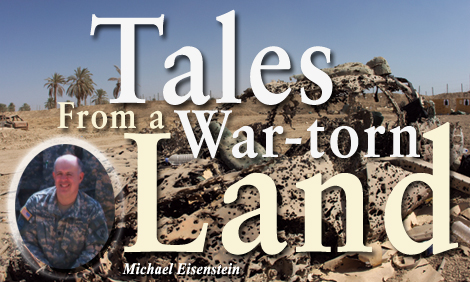
“There is always
the element of
danger; but
everyone tries to
stay prepared.”

Balancing the Scales of Justice
A lawyer whose private practice and home are in Baltimore, Md., Michael Eisenstein, BS’77 (T), was “involuntarily activated” as a member of the Army Reserve. With about two months notice, he shipped out in April 2006 and was stationed outside Mosul, Iraq, with the U.S. Army Judge Advocate General (JAG) Corps.
“Mosul is overall a safe area,” he says, despite reports of frequent suicide bombings, kidnappings and sectarian violence. One of Iraq’s largest cities, Mosul is a major center for trade, industry and communications. It is inhabited by Arabs, Kurds, Assyrians and Turkmen. Situated in the northwestern part of the country, on the banks of the Tigris River, the city is near the ancient Assyrian city of Nineveh.
From Mosul, Eisenstein traveled by convoy throughout Northern Iraq handling claims and contracts. These were mostly petitions by Iraqi citizens or soldiers made under the Foreign Claims Act against the U.S. government for wrongful death, injury or disability [and property damage] caused by noncombat activities of U.S. military personnel such as training and maneuvering. The act also requires compensation for property seized for military use.
Eisenstein de-
scribes the Iraqi
people as “not
much different
than us.” From
farming to in-
dustry to city life,
he saw a wide
variety of condi-
tions. In some
parts of the
country, the
people are very
poor and the
standard of living
very different
from that in the
United States.
Yet, in other
parts, such as
Dahuk, it is very
similar to the U.S.Asked what a typical claim might entail, Eisenstein says, “Each is different on its own merits.” Noting the difference between his work at home and his work in Iraq, he comments, “You don’t see many missile and weapons claims at home.”
With a juris doctorate from the University of Baltimore, Eisenstein served full-time for two years in the JAG Corps and has remained in the Army Reserve since. His deployment to Iraq was his first direct exposure to war. He reports that the conditions on base were “much better that expected,” but there were “still far fewer amenities than living in the U.S.”
Despite the relative safety of the base, Eisenstein describes a feeling of uneasiness. “I was a little apprehensive at first,” he reports. “There is always the element of danger; but everyone tries to stay prepared.” Occasionally, mortar rounds fell into the base, sending soldiers scuttling for their bunkers, “but they were not very accurate,” he recalls.
Eisenstein describes the Iraqi people as “not much different than us.” From farming to industry to city life, he saw a wide variety of conditions. In some parts of the country, the people are very poor and the standard of living very different from that in the United States. Yet, in other parts, such as Dahuk, it is very similar to the U.S. “Northern Iraq is a wide space with a range of everything,” Eisenstein says.
By and large, the Iraqis Eisenstein dealt with — citizens, attorneys and soldiers — were cooperative, intelligent and “easy to work with.” There were many suits regarding death, injury and disability, and “our role was to help and assist them.” Working under international law, Eisenstein’s unit saw the claims process through from filing to mediation to paying settlements.
Just weeks before his March 20 return to the U.S., Eisenstein reflected, “You certainly miss your family and friends being away for such a long time.” However, his access to e-mail, “snail mail” and telephones made it much easier to keep in touch with his wife, Ruth, and children: Samuel, 19; Sarah, 17; Marina, 10; and Daniel, 4.
Fortunately, there are two other attorneys in his firm, so Eisenstein’s caseload was covered in his year of absence.
Though things could be frustrating and seem to move at a slow pace, Eisenstein was most satisfied with “being able to do my job with my fellow soldiers.” Plus, he comments, “I’ve made some good friends while over there.”
— R.M.
Surgeon Proud | Soldier’s Story | Volunteer Meets Refugees
Nursing the Wounded | Article Home
FDU Magazine Home | Table of Contents | FDU Home | Alumni Home | Comments
©Copyright 2007 Fairleigh Dickinson University. All rights reserved.
For a print copy of FDU Magazine, featuring this and other stories, contact Rebecca Maxon, editor, 201-692-7024 or maxon@fdu.edu.